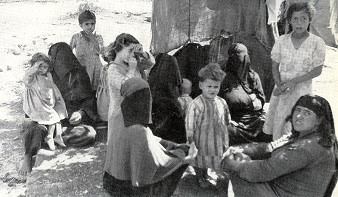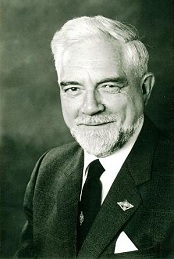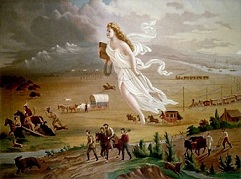At daggers drawn with 'demonized flesh' (4)
Murray Dixon and the specter of Christian Zionism
PART FOUR - Theology and fraud
Needless to say, it is not that "the Arab" is not an individual, but that the Christian Zionists are determined not to see him as one. As a non-person, as "a naughty child who throws stones", his subordination can be made to seem essential — as can the firm, paternalistic hand that ensures he accepts, but remains relatively harmless in, his assigned role of Ishmael. This is the role of the violent outsider (Gen. 16:12) and wanderer (Gen. 37:25) who, ipso facto, cannot be attached to land, and whose claims of attachment must therefore be a subterfuge. For this eternal reprobate, this sensual antagonist of the more favored, intellectual Isaac, there can be no peace except the peace of capitulation. At every turn, he is to be policed by prurient scholars, draconian bureaucrats and casually callous soldiers of the Israel Defence Forces. Even his awareness of himself is to be shaped by the definitions of others.
But the Christian Zionists have another reason for ignoring the individual: With their eyes on the Tribulation, the Rapture, the Battle of Armageddon and other chiliastic events, they have little time for minutiae. They prefer the panorama — the cosmic, inexorable scheme of things, in which the individual is subsumed. They talk grandiloquently of peoples and "nations": those abstract entities that will be collectively rewarded if they act to Israel's benefit and collectively punished if they don't. (I put the latter term in quotation marks because the biblical idea of a nation is not analogous to the modern concept of a state.)
There is little room for law in all this, because legislation tends to deal with discrete, concrete cases. The last person a Christian Zionist wants to know about is poor, dispossessed Abdullah from, say, Shatila refugee camp in Lebanon, who still treasures the deeds of his property in Palestine (as it was until 1948) and the key to his now non-existent front door. So he elevates the whole issue of land ownership in Israel / Palestine to the rarefied level of theology. Hence the reference to the Israelis' and Palestinians' "strong but conflicting theologies of the land" in ITAC's press release, dated July 29, 2006, dissociating itself from the Anglican Peace and Justice Network's call for (among other things) "the withdrawal of Israeli armed forces from all occupied areas . . . [and] the immediate dismantling of the separation wall . . . wherever the wall violates West Bank land."




























